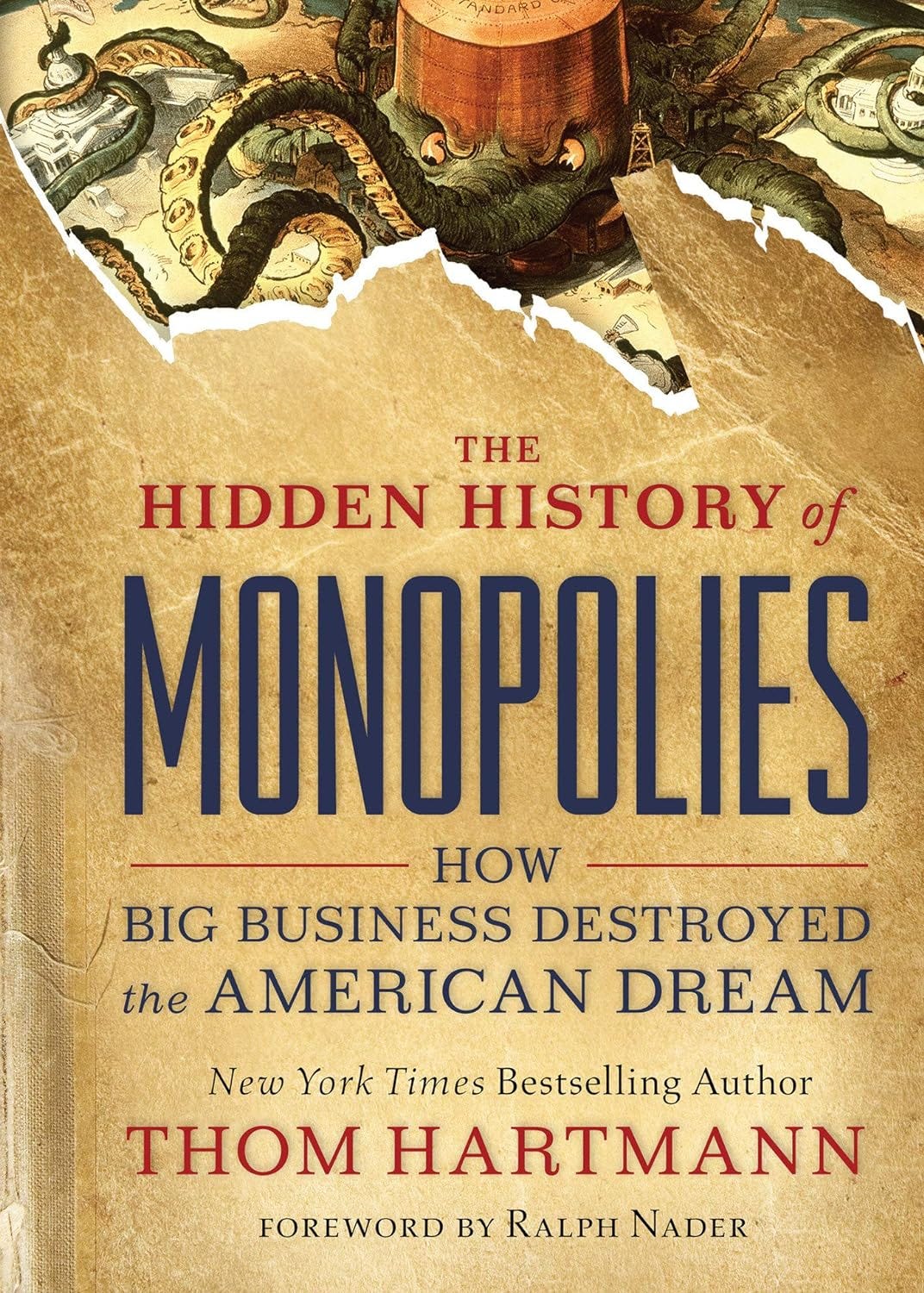Turning Financial Power into Political Power
Your weekly excerpt from one of my bestselling books. This week: "The Hidden History of Monopolies: How Big Business Destroyed the American Dream"

Turning Financial Power into Political Power
Fox News isn’t the only example of a business that is willing to cut into its profits for the short term in order to change minds and drum up support for policies that will make it richer in the long run.
Just prior to the 2016 presidential election, the Progressive Change Institute commissioned a nationwide poll conducted by the highly respected firm GBAO Strategies. The result showed clearly just how deep and extensive is the problem of monopolistic, legalized political bribery in America.19
When asked whether the US government should negotiate prescription drug prices, 79% of Americans agreed and only 12% opposed. But because Big Pharma bribed Congress to the tune of $2.5 billion over the last decade, giving money to 9 out of 10 members of the House and 97 out of 100 members of the Senate, nothing has changed.20 Tens of thousands of Americans die every year because of this bribery.21
Seventy-one percent of Americans (including 56% of Republicans) say that all Americans should have access to a debt-free college education, but banks spent millions bribing DC politicians to keep George W. Bush’s Bankruptcy Abuse Prevention and Consumer Protection Act of 2005 in place so that students can’t discharge student loan debt in bankruptcy.22 At the same time, colleges and universities spent additional millions bribing politicians to ignore the soaring costs of higher education: as the Wall Street Journal reported in 2015, colleges and universities have become one of the most effective lobbying forces in Washington, “employing more lobbyists last year than any other industries except drug manufacturing and technology.”23
A 2015 survey of likely 2016 voters found that fully 71% of Americans (and 63% of Republicans) supported giving “all Americans the choice of buying health insurance through Medicare or private insurers,” but the massively profitable health insurance industry spent over $158 million in 2018 bribing and influencing politicians to maintain their billions in quarterly profits.24
The list of issues and industries where bribery has corrupted our legislative system could easily fill a book of its own.
Issues blocked politically by special interest groups and billionaires include the following: infrastructure jobs program (71% support, with 55% of Republicans); expanding Social Security benefits (70% support, 62% GOP voters); getting corporate executives out of “revolving door” government positions (59% support, 55% GOP); guaranteeing net neutrality (61% support, with 52% of Republicans); breaking up big banks (71% of Democrats and 51% of GOP); restoring the top 50% income tax rate that Reagan nuked (71% Democratic support, 53% GOP); and reprising FDR’s “government as the employer of last resort” job programs to rebuild America (83% Democratic support, 55% GOP).25
About 70% of Americans are concerned about climate change, but we’re not holding the fossil fuel industry accountable.26 Oil Change International documented in their study of the impact of oil industry lobbying, “In the 2015–2016 election cycle oil, gas and coal companies spent $354 million in campaign contributions and lobbying and received $29.4 billion in federal subsidies over those same years—an 8,200% return on investment.”27
Americans are dying from vaping, but there’s still no regulation of “inhalable” drugs like nicotine because of decades of aggressive bribery of politicians by the tobacco industry.28
We’re watching the destruction of public education by for-profit charter schools,29 while the private prison industry is lobbying for more free prison labor and more kids in cages.30
Businesses, because of deregulation from Reagan to Trump, are pumping more poison in our air, water, and food31 and exploiting low-income workers and people in the military via payday lenders.32
Meanwhile, we helplessly watch an orgy of gun violence in the United States33 as our country spends more on our military than the next eight countries combined.34
It all goes back to one thing: bribery by monopolistic interests.
Political bribery has always been a problem, but it exploded during the Reagan administration because in 1976 the US Supreme Court had said,35 for the first time in American history, that when billionaires and corporations bribed legislators, it was a matter of First Amendment–protected free speech; the Court later amplified that with its corrupt 2010 Citizens United decision.36
Because of this, today the odds of legislation that puts the interests of working people first is equivalent to random chance, as Princeton’s Gilens and Page found in a massive 2014 study.37
Martin Gilens wrote in the Boston Review in 2012, “When preferences diverge, the views of the affluent make a big difference, while support among the middle class and the poor has almost no relationship to policy outcomes. . . . [T]he support or opposition of the poor or the middle class has no impact on a policy’s prospects of being adopted.”38
At the September 12, 2019, Democratic debate there wasn’t a single question about the bribery of our legislators by billionaires and corporations; only Bernie Sanders and Elizabeth Warren pointed out the “corruption” problem, and their comments were ignored by all the other candidates—who were competing with each other and the GOP for billionaire and corporate money.
There are movements to get money out of politics (such as Move to Amend, among others), but the flow of money into our politics has dampened any serious discussion from our corporate media and bought-off political leaders.
So long as corporations are considered “persons” that can spend unlimited amounts of money in our politics, the monopolists will continue to flood our legislatures with corrupting money.


